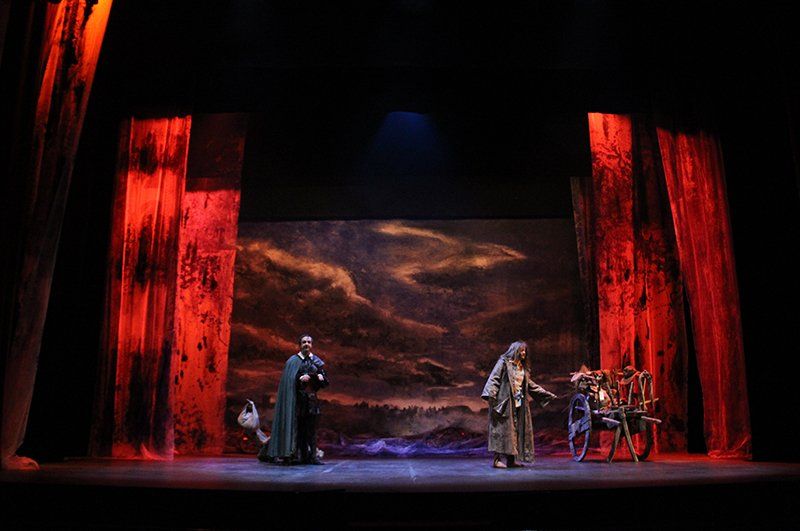THE DOGS' COLLOQUY
Morfeo Theatre Company
BOOK YOUR TICKET
Reservations will be accepted from Monday to Friday from 10:00 a.m. to 2:00 p.m.
The price of admission is decided by the audience at the end of the show (we suggest starting at €5)
THE COLLOQUY OF THE DOGS
Nominated for "best leading actor" ROJAS THEATRE AWARDS 2012
HARO GOLDEN GARNACHA COMPETITION 2012
GOLDEN AGE FESTIVAL OF EL PASO (USA) 2013
CLASSICAL THEATRE FESTIVAL OF CIUDAD JUAREZ (MEXICO) 2013
ALMERIA GOLDEN AGE DAYS 2015
CLEVELAND (USA) SPANISH THEATRE FESTIVAL 2016
SAN ANTONIO THEATRE FESTIVAL (USA) 2016
DELAWARE THEATRE FESTIVAL (USA) 2016
CERVANTES INSTITUTE OF CHICAGO (USA) 2019
SYNOPSIS
Cervantes wrote this, his last exemplary novel, in the twilight of his life, just a few years before his death, masterfully demonstrating an ironic pessimism that made him ahead of his time with a narrative unparalleled and unprecedented in its modernity. He stages the conversation between two dogs, named Cipión and Berganza, who, upon discovering they have acquired the ability to speak, decide to recount their experiences with different masters in the Spain of that era, already expecting a prophecy that will transform them into men. The enigma is surprisingly resolved after a ghostly apparition that explains the reason for their magical transformation.
The story is constructed according to the principles of the picaresque novel. Through the counterpoint of the dogs' comments—in our adaptation, they are people—an old and taciturn Cervantes reflects on the relationship between verisimilitude and reality, on the corruption and selfishness of society, and most importantly, on the fraternity of humankind.
The production combines a period aesthetic, with costumes taken from Velázquez portraits, framed within a contemporary set. A painted backdrop inspired by El Greco depicts a timeless landscape, and enormous abstractly painted gauzes replace the theater's "black box" with a receptacle of light that follows the characters' emotions and the story's meaning in a completely conceptual way. There is also strong characterization to transform the actors into two ragged beggars.
In our proposal, the original roles played by two dogs have been changed to those of an impoverished nobleman and a ragged beggar, also "dogs" disinherited by fortune, who, with the same zeal as Cervantes, narrate their experiences between bitterness and comedy, in a subtle, and sometimes undeniable, comparison with our times.








